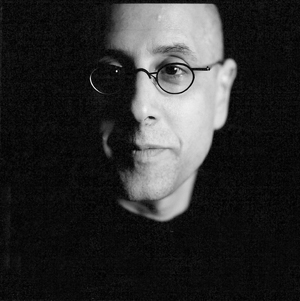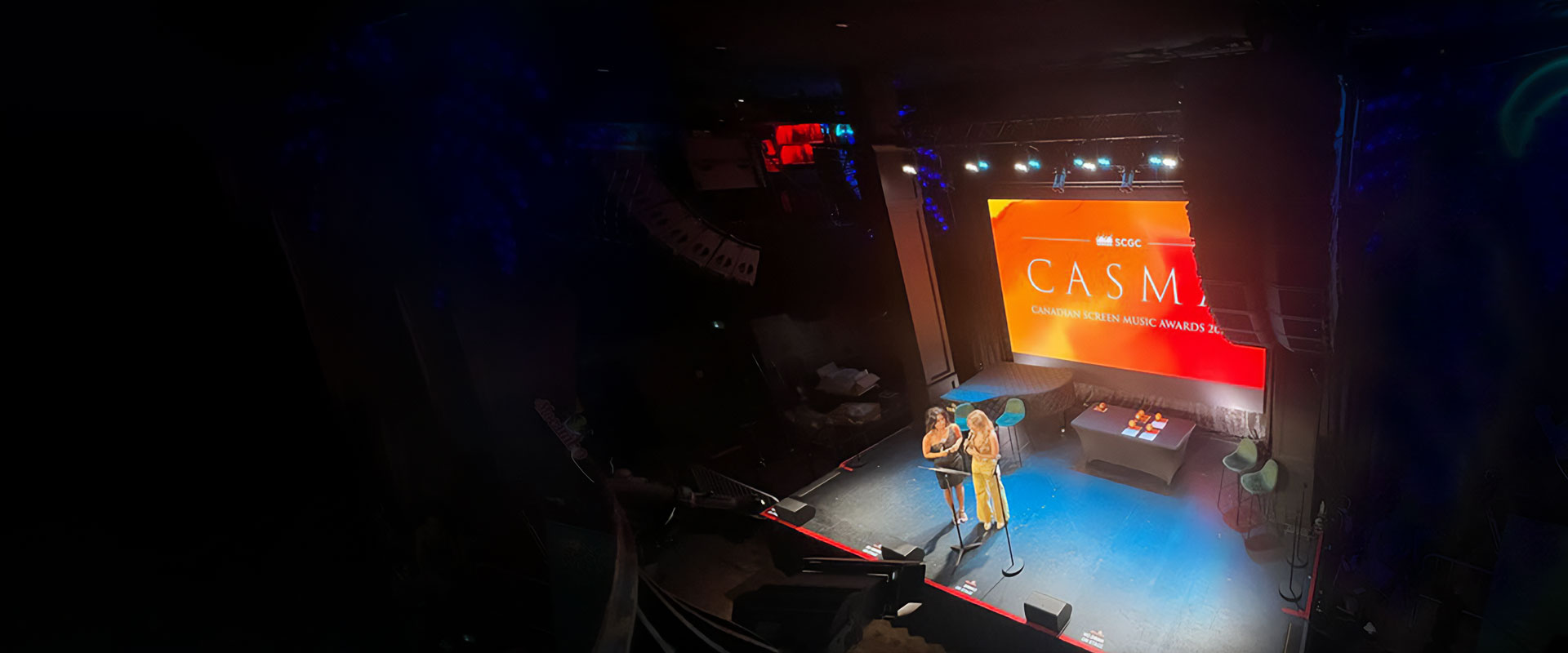VIEW FROM THE PODIUM
John Welsman with Derek Treffry
This is an interesting time in the history of our industry. Never before has it been so easy for those who are creative to express themselves and have their creative work distributed worldwide; yet never before has it been so challenging for those who hope to actually earn a living from their creative endeavours, especially those who work in music.
What will the migration of viewers to the Internet mean for the traditional broadcast model upon which our livelihoods depend? What will the bold efforts by large publishers to move catalogs from one Performing Rights Organization to another mean for our futures? Faced with so many opportunities and challenges in a shifting landscape, how can the individual composer affect positive change? Well, each of you have already started that process by joining and being part of the SCGC.
The Screen Composers Guild of Canada has never been a more important advocate for media composers in Canada and beyond our borders than it is today. With the trend to lower up front fees for our work, and greatly reduced royalty revenue as a result of the migration of viewers away from traditional TV to ‘over the top’ services like Netflix, Hulu, and Shomi, new models must be found to ensure a sustainable economic future. (Editor’s note: Over the top services are those broadcast entities which don’t come to us via the traditional cable box supplied by your TV provider.)
 Some believe the royalties situation will correct itself as these new services mature and grow in size. But what about the years between now and then? Are the percentages that PROs collect a fair reflection of the value that the score brings to the final result? It’s early days, but in the meantime, remember that it’s the SCGC that is your voice.
Some believe the royalties situation will correct itself as these new services mature and grow in size. But what about the years between now and then? Are the percentages that PROs collect a fair reflection of the value that the score brings to the final result? It’s early days, but in the meantime, remember that it’s the SCGC that is your voice.
The Guild is many different things to many people. Maybe it was the Apprentice Mentor Program that first attracted you to the SCGC. Perhaps it was the array of professional development programs put on each year by so many dedicated and hard-working volunteers. Or maybe it’s the unusually open and generous community epitomized by our invaluable Discuss List which is the envy of so many other industry organizations.
At the top of the list of all the important work the SCGC is engaged in is advocating for the rights of all composers, often at the highest levels. This is something that individual composers are not able to do for themselves and only a collective can effectively do. The SCGC has respect in the industry. We are speaking up, more often and more loudly than ever, and the industry is listening.
The SCGC is currently a respected member of the Canadian Creators Coalition – with our Chair Marvin Dolgay serving as Co-Chair – which lobbies the government on behalf of its creator members, including the DGC, SOCAN, ACTRA, CFM, the Writer’s Guild, the Writer’s Union, and the Songwriters Association of Canada to name a few. We are founding members and a respected voice of Music Creators North America (MCNA), a coalition of music creator organizations advocating for music creators’ rights at an international level. Through the MCNA we also have a voice at the Executive Committee of CIAM, the International Council of Music Authors, where we have formed alliances with creators’ groups from EU, Latin America, Africa, and most recently the Asia-Pacific. We’re also members of ACCORD, the alliance of Canadian music creators, publishers and rights management stakeholders.
DGC, SOCAN, ACTRA, CFM, the Writer’s Guild, the Writer’s Union, and the Songwriters Association of Canada to name a few. We are founding members and a respected voice of Music Creators North America (MCNA), a coalition of music creator organizations advocating for music creators’ rights at an international level. Through the MCNA we also have a voice at the Executive Committee of CIAM, the International Council of Music Authors, where we have formed alliances with creators’ groups from EU, Latin America, Africa, and most recently the Asia-Pacific. We’re also members of ACCORD, the alliance of Canadian music creators, publishers and rights management stakeholders.
What does this all mean for you? It means that you can be assured that during uncertain times the Guild is here for you and is committed to ![]() advocating on your behalf. At the risk of sounding trite, though, maybe it’s not enough to simply ask what the Guild can do for you; maybe it’s time to ask, what can you do for the Guild?
advocating on your behalf. At the risk of sounding trite, though, maybe it’s not enough to simply ask what the Guild can do for you; maybe it’s time to ask, what can you do for the Guild?
Certainly an organization such as ours, with limited resources, relies a great deal not only on the efforts of our staff but also on the goodwill of its members and their willingness to volunteer. This is your organization. You are the Guild, and the Guild is you. And the more you are willing to engage, the more you will benefit in return.
But it can be even simpler than that. Your continued membership in and of itself is an invaluable asset. The greater our numbers and the larger the proportion of the professional composing community we directly represent, the louder and more effective the Guild’s voice is when it advocates for the protection and advancement of your rights.
If you’re still with me, there’s more. We probably all know a composer who isn’t yet a member. Perhaps they don’t know who we are or what we do. Or maybe they’re not convinced they’d get enough benefit from being a Guild member.
I ask you to consider this a call to arms to start spreading the word. Let these other composers know we’re here – tell them about the Guild and what it has to offer. Let them know about the amazing community we’ve built. Let them know that there is no other organization more dedicated to their future in this industry. And remind them of this: there is strength in numbers, and every one of you makes our voice that much stronger.
***************************
INDUSTRY ROUNDUP – SUMMER 2016

In May, President John Welsman and Chair Marvin Dolgay attended two days of MCNA and CIAM meetings in New York. This link will give you an oversight of the topics of discussion and will give you a feel for the global creators network and alliance that the SCGC is now a part of:
http://www.ciamcreators.org/ciam-meets-music-creators-north-america-new-york/
Here is the NY Times article on the U.S. Justice Department’s (DOJ) ruling regarding changes in the consent decree. Although most immediately a songwriter issue, this recommendation could greatly affect the health of our PROs. As MCNA members, we have attended a couple of meetings with the DOJ and signed onto letters arguing against this recommendation. We are very disappointed with the DOJ’s conclusions.
Here is some information about one of the few initiatives recently launched by SOCAN:
http://www.completemusicupdate.com/article/sacem-announces-euro-repping-deal-with-socan-expanding-the-armonia-network/
Here is an article from Billboard Magazine that spotlights women composers. There are also some interesting reads on the sidebar of related articles:
http://www.billboard.com/biz/articles/news/tv-film/7401670/the-women-who-score-concert-featuring-award-winning-female
Past the ad, here is a video giving you a breakdown of who earns what on a $200 million movie:
http://www.vanityfair.com/hollywood/2016/06/movie-budget-breakdown-video
Here is an article on time management and focus, a topic that has come up on the SCGC discuss list in the past:
https://medium.com/keep-learning-keep-growing/manage-your-brain-to-meet-deadlines-557d45a2b082#.geqadzbnx
******************************

SCGC, CAVCO and SOCAN’s New Cue Sheet- What You Need to Know
by Craig McConnell
The tax credit system has long been a source of frustration for composers across the country.
We have seen scenarios where a production company hires a Canadian composer for a 15 second theme, then fills the rest of the series with foreign production music and still qualifies for the full tax credit. We have also seen situations where an American composer and a Canadian composer are hired on a series, but the bulk of the work – and money – are sent south, with the production still receiving the full tax credit. The problem is that the organization overseeing the tax credits, CAVCO (Canadian Audio-Visual Certification Office), merely requires the production companies to present a contract showing a Canadian credit. This leaves them with a lot of wiggle room to get creative with how they source their music, and they frequently take full advantage.
We at the SCGC believe that these abuses of the system fly in the face of the original intent of the tax credit system, which is to generate and maintain Canadian jobs. We have been expressing our frustrations to CAVCO over many years, but the political will to tweak the system was lacking. However, we now have a new Liberal government, a new, energetic Heritage Minister and, most importantly, a new CAVCO Director. The time is right to make our case again.
The Guild’s long held view has been that Producers should be required to submit Cue Sheets alongside their contracts when applying for the tax credit. This way, it could be determined who the actual composers on a production truly are. The cue sheet would not necessarily show their nationality and residency status (not all SOCAN members are Canadian citizens/residents, after all), but there is one piece of information that could – a CAVCO number.
 Over the last year, the SCGC worked closely with SOCAN to develop a new version of their official Cue Sheet that includes CAVCO information. Right beside the “Name” column there is now a “CAVCO #” column; also, right below the “Total Musical Duration” box, there is now a “Total CAVCO Musical Duration” box. With this information included on a Cue Sheet, it can now be determined at a glance how many composers on a production are resident Canadians, and perhaps most interestingly, what proportion of a production’s music is of Canadian origin.
Over the last year, the SCGC worked closely with SOCAN to develop a new version of their official Cue Sheet that includes CAVCO information. Right beside the “Name” column there is now a “CAVCO #” column; also, right below the “Total Musical Duration” box, there is now a “Total CAVCO Musical Duration” box. With this information included on a Cue Sheet, it can now be determined at a glance how many composers on a production are resident Canadians, and perhaps most interestingly, what proportion of a production’s music is of Canadian origin.
Members of the Guild’s executive are headed to Ottawa this summer for a meeting with the new CAVCO Director. They will make the case on our sector’s behalf that this updated Cue Sheet should be a new requirement for producers submitting for the tax credit. This new step would make producers much more wary of bending the rules, and CAVCO would be able to see first hand if their guidelines are truly keeping Canadian composition jobs in Canada.
Meanwhile, the political backdrop to all of this could not be more volatile. The new Heritage Minister, Melanie Joly, is committed to shaking up the entire regulatory framework of Canadian culture and broadcasting, in a seemingly well-intentioned effort to make our creative sectors more “competitive” globally. History shows, meanwhile, that when ![]() rulebooks are being re-written, the special interests with the most powerful lobby usually come out on top (and that’s generally not the artists). Where Canadian composers will land in this once-in-a-generation shakeup is unclear, but one thing is certain: your SCGC Board will be pro-active and engaged in representing your interests.
rulebooks are being re-written, the special interests with the most powerful lobby usually come out on top (and that’s generally not the artists). Where Canadian composers will land in this once-in-a-generation shakeup is unclear, but one thing is certain: your SCGC Board will be pro-active and engaged in representing your interests.
We are living in interesting times.
******************************
 With New Digital Technologies, SOCAN Aims To Be The World’s Most Comprehensive Music Rights Service
With New Digital Technologies, SOCAN Aims To Be The World’s Most Comprehensive Music Rights Service
APIs, Royalty Guru, MediaNet to better serve our screen composers, other music creators
by Michael McCarty Chief Membership & Business Development Officer, SOCAN
SOCAN was created with a simple premise to solve a complicated problem: provide an easy, efficient and fair way to license music, enabling screen composers and other music creators to be paid fairly for the use of their work. But the way that people listen to music has changed. And the required information and digital back-end systems that would allow easy licensing and payments in the new streaming and digital music industry were never put in place. This creates clear challenges for our music creators.
SOCAN wants to enable more music to be heard, streamed, discovered and shared through streaming and new digital technologies, and ensure fair compensation for its members. With the launch of our first APIs (application program interfaces), and acquisition of Royalty Guru, and MediaNet, SOCAN is now able to offer a full suite of services to our members, leveraging new tech to solve problems and break down barriers. These developments not only help our efficiency and accuracy, they improve our cost base, which benefits all of our members. And much of this new technology can, and will, be adapted to the unique royalty needs of our screen composers.
Our first APIs – the digital glue that links large databases such as SOCAN’s with apps, mobile phones, and websites – are “Song Registration” and “Concert Notification.” The Song/Work Registration API enables songwriters to use new workflow apps and software to register their songs more accurately with their music publishers, labels, digital services and SOCAN. The Concert Notification API enables our members to quickly and easily register their concerts with SOCAN to get paid faster and more accurately for live performances. We’re also currently working on enabling “workflow” companies focused on the audiovisual music community to ensure that SOCAN screen composers will be able
 to take advantage of exciting new productivity tools, using a cue sheet API that will allow them to similarly submit their sheets more quickly and conveniently, and get paid faster.
to take advantage of exciting new productivity tools, using a cue sheet API that will allow them to similarly submit their sheets more quickly and conveniently, and get paid faster.
Royalty Guru allows our more than 135,000 members to visualize their data in a variety of easy-to-use ways to help them manage their business and career in music. It enables them to better understand the trends in royalties earned when their music is played live, on radio, on television and streamed online. We encourage feedback on Royalty Guru through the lenses of you, our screen composers, so that we can better serve your needs. (Just e-mail us at members@socan.ca.) Our screen composers’ town hall meeting in Toronto in April this year was highly successful, and will be replicated in Montreal and Vancouver to obtain further feedback on which we’re able to act, for your benefit.
SOCAN’s purchase of MediaNet, a pioneer business-to-business music technology, will offer 360-degree music rights administration to SOCAN members. It will make SOCAN the leader in robust, accurate matching of repertoire music data to the rights owners of that music, one of the most
significant challenges facing the digital music ecosystem worldwide.  This will increase revenue streams for the creators of the music played on digital platforms and other services relying on uploads. With MediaNet, SOCAN will be able to identify digital performances from around the world in real time, with access to granular performance data to make better decisions, identify trends, and increase revenue for members. This technology will also evolve and adapt to benefit screen composers as well.
This will increase revenue streams for the creators of the music played on digital platforms and other services relying on uploads. With MediaNet, SOCAN will be able to identify digital performances from around the world in real time, with access to granular performance data to make better decisions, identify trends, and increase revenue for members. This technology will also evolve and adapt to benefit screen composers as well.
Now more than ever, SOCAN is committed to serving the needs and recognizing the accomplishments of our screen composers. For example, at our recent 2016 SOCAN Awards gala in Toronto, we doubled the number of film and television awards from the previous year; featured a “live sync” orchestra to play the nominated themes while the trailers for those movies rolled; and presented the 2016 Cultural Impact Award – one of our highest achievement awards – to screen composer Dolores Claman for her iconic and enduring Hockey Night in Canada theme.
Editor’s Note: The “Song Registration” and “Concert Notification” APIs are currently available at: http://developer.socan.ca/
For more information, please visit the following links:
APIs: http://www.socan.ca/news/socan-launches-apis-drive-music-royalties-innovation
Royalty Guru: http://www.socan.ca/news/socan-makes-royalty-analysis-dashboard-available-its-members
MediaNet: http://www.socan.ca/press-release/socan-expands-technology-and-services-acquisition-music-data-company-medianet
******************************
 The Journey To Simple
The Journey To Simple
by Ari Posner
As a piano player turned composer, I learned about simplicity the hard way. When composing and arranging for ensembles, one problem that keyboard players can encounter early on is the tendency to put in too many notes. I guess the thinking goes something like, “this voicing sounds good on piano, so I’ll just transfer these notes to the strings and brass”, or whatever the band might be.
While studying at York University, I had the chance to sing in a jazz choir where we learned all kinds of arrangements going back to vintage Gene Purling and up to some of the most current Take Six pieces at the time. The sound was so stunningly rich and beautiful that I couldn’t help but want to try a hand at my own arrangements.
The very first piece I arranged for the choir was a jazz version of the well known song “Feed the Birds” from Mary Poppins. I spent countless hours at the piano trying to find the most beautiful and intricate voicings I could. Wanting more notes in every chord, I found myself splitting parts as if I were chopping wood to store for the long winter. Needless to say, the first read through of this arrangement was a disaster. I had no conception of how hard it would be to sing, how unreasonably wide a range I had chosen and how thin certain parts would sound with only two or three voices on them. In short, the piece was way too thick and far too complicated. When I went back and looked more carefully at some of the Gene Purling arrangements, I was struck by how simple and elegant the writing was. He rarely split sections into two parts, mostly using the standard SATB four note voicings for his chords and wow did his work ever sound amazing.
Over the years I have found time and time again that some of the most remarkable arrangements, both for classical and jazz orchestra are often done by horn players and in particular, trombonists. I’ve seen it too many times for it to be just a coincidence and after  discussing the phenomena with many colleagues I’ve come to realize that the trombonist is a true ensemble player often sitting inside the chords on the thirds, fifths or sevenths. Nestled within an arrangement, the trombones are offered a unique perspective of simplicity. They learn about playing a “part” and, from the inside out, discover how to build harmonic structures that blend and ring. If they are playing great arrangements in great bands, trombonists get to learn early on the cardinal rule of less is more.
discussing the phenomena with many colleagues I’ve come to realize that the trombonist is a true ensemble player often sitting inside the chords on the thirds, fifths or sevenths. Nestled within an arrangement, the trombones are offered a unique perspective of simplicity. They learn about playing a “part” and, from the inside out, discover how to build harmonic structures that blend and ring. If they are playing great arrangements in great bands, trombonists get to learn early on the cardinal rule of less is more.
Yes, you know that guy, Les Izzmore. I can’t stand him sometimes but he’s almost always right. And it’s become evident to me that most players and composers, as they grow and evolve, do ultimately navigate some kind of journey from complex to simple, from more to less.
Many years ago, I had the privilege of studying a little bit with Don Thompson while still at school and also privately. Don plays the piano, vibes, bass and drums, all at a world-class level. And I remember him both teaching and modeling a musical philosophy that every note should mean something. In other words, don’t write or play notes if they don’t have a reason for being there.
More than a decade later, I read an interview with Don in which he was asked what instrument he finds the most challenging. And much to my surprise his answer was the bass. At first glance this seemed odd to me since the function of the bass, especially in
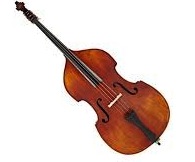 jazz, is pretty specific. And more to the point, 95% of the time it is a monophonic voice in the band that almost always plays the root of the chord on the downbeat of the bar. How hard could that be??? Of course upon further reflection, given these limitations imposed most of the time by function and genre, I realized what a supreme challenge it must be to make every note mean something on the bass. In the bar coming up, there are four beats to get us from Cm7 to F7. What are the best and most meaningful choices to make at this particular point in the song? How can I not repeat myself? How can I best support the melody or soloist? Those are just a few questions to answer, in real time no less if you’re playing jazz. That’s a lot of pressure actually.
jazz, is pretty specific. And more to the point, 95% of the time it is a monophonic voice in the band that almost always plays the root of the chord on the downbeat of the bar. How hard could that be??? Of course upon further reflection, given these limitations imposed most of the time by function and genre, I realized what a supreme challenge it must be to make every note mean something on the bass. In the bar coming up, there are four beats to get us from Cm7 to F7. What are the best and most meaningful choices to make at this particular point in the song? How can I not repeat myself? How can I best support the melody or soloist? Those are just a few questions to answer, in real time no less if you’re playing jazz. That’s a lot of pressure actually.
Given the grueling deadlines that we often face as screen composers, I find it can be incredibly challenging to make every note in every cue mean something. But I strongly believe that’s the kind of thinking to strive for in our scores. In this day and age it’s quite easy to get a little trigger-happy with the millions of sounds we have at our fingertips. We can even justify adding more parts by telling ourselves that it’s better to have too much and mute things at the mix rather than not having enough. Whether we are doing mock-ups or final mixes on our DAWs, it is all too tempting to throw a few more parts or sounds into our cues, and by doing so move further away from clarity and simplicity.
The good news is that there are always the stories, images, and emotions to guide us. Asking ourselves whether a note means something in connection to the picture we serve is a very different question than asking whether it has pure musical integrity on its own. Striving for both is obviously ideal, and I suspect the most successful scores achieve exactly that. The next time you’re about to lay down another cool part, ask yourself if it has a reason for being there. And think about Les Izzmore … what would he say?
a very different question than asking whether it has pure musical integrity on its own. Striving for both is obviously ideal, and I suspect the most successful scores achieve exactly that. The next time you’re about to lay down another cool part, ask yourself if it has a reason for being there. And think about Les Izzmore … what would he say?
******************************
FILM SCORING: WHAT IT IS and WHAT IT ISN’T
by Amin Bhatia

So you wanna write film scores…
Film scoring is not getting to sit in a room and play music all day. It isn’t about melody, harmony, rhythm, orchestration, the lydian mode or tritones. It is not about your new gear, your vintage gear, which DAW you use, the amount of RAM you have, or which sample libraries or plug-ins you own.
It is not about your chops, or your schooling or your awards. It is not about hearing your stuff played by an orchestra or being an entire orchestra all by yourself. It is not about your demo reel, or your logo or your agent or your website.
Film scoring is not about schmoozing, or networking or being able to tell jokes. It is not about winning over someone else’s client, or befriending someone you hate in order to get connections. It is not about how many soundtracks you own, or famous people you’ve actually met, or styles that you can rip off.
It is not about coffee (well, okay sometimes….) or being your own boss, or setting your own hours. It is not about getting residuals, renovating your house, or having a space in the happenin’ part of town.
Film scoring is by no means cool. It is not about getting discounts, or getting free stuff, or getting laid.
Film scoring is about the pursuit of that intangible musical entity, that when fused with the picture becomes an unconscious part of the whole. It is about being thrown into a musical situation you’ve never done before and emerging with something that you never thought you could do.
It is about always improving yourself not only musically but personally and being open to  new situations daily. It is about listening to what’s out there, not only on the screen but on the street, absorbing it all and giving it back in a way that is only you.
new situations daily. It is about listening to what’s out there, not only on the screen but on the street, absorbing it all and giving it back in a way that is only you.
Film scoring is a business that you need to manage in order for you to make a living. It is about balancing your career time with the time for yourself and your loved ones. It is about missing another vacation in the pursuit of your career. It is also about declining a gig to give time to yourself and to others who need you.
It is about struggling for hours or days on the simplest of passages just so that when it’s done you know it works, but if the client doesn’t share your opinion you throw it out and start over. It is about the music and sound that you can give to the director to help his or her
vision. It is about being a part of a team, knowing when to contribute and knowing when to shut up.
Film scoring is not about the perfect music cue … it is about a music cue that makes the picture perfect.
Amin Bhatia is a film music composer
Send any and all rebuttals to amin@bhatiamusic.com
******************************
SCGC Member News June 2016
compiled by Janal Bechthold
APPEARANCES
Academy Talks – Music in Film and Television: Ari Posner joined music supervisor Michael 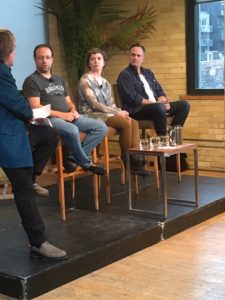 Perlmutter, sound designer Michelle Irving, and digital sound producer Daniel Pellerin for a panel discussion on music and sound in film and television.
Perlmutter, sound designer Michelle Irving, and digital sound producer Daniel Pellerin for a panel discussion on music and sound in film and television.
ASCAP NYU Steinhardt: Michelle Osis, David Arcus, Michael Paolucci, and Iain Gardiner participated in this prestigious workshop, learning classical Hollywood film scoring and the techniques of the 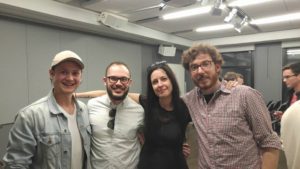 modern scoring world. The highlight of the workshop is a recording session with top studio musicians in NYC including members of the NY Philharmonic and The Metropolitan Opera Orchestra.
modern scoring world. The highlight of the workshop is a recording session with top studio musicians in NYC including members of the NY Philharmonic and The Metropolitan Opera Orchestra.
Factory Media Centre: Steph Copeland presented a  masterclass on Scoring Independent Features, including topics such as working within a budget, licensing music for films, musical themes, and creating a manageable work flow.
masterclass on Scoring Independent Features, including topics such as working within a budget, licensing music for films, musical themes, and creating a manageable work flow.
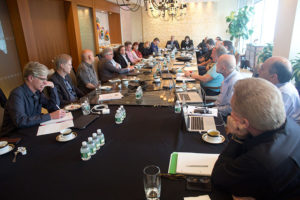
Music Creators North America: SCGC president John Welsman and past president Marvin Dolgay attended the Music Creators North America (MCNA) meeting in New York. The MCNA hosted the The International Council Of Music Authors (CIAM) Executive Committee and representatives of CIAM’s partner alliances from Latin America and Africa.
TO Webfest: Adrian Ellis moderated a discussion with Adam Clarke (location sound recordist) and George Flores (sound designer) on location recording, ADR, mastering, music & music copyright. Adrian also was part of Webfest Connect, an opportunity for creators to have one-on-one discussions with an industry specialist.
TV1 “Making Movies”: Mark Korven was interviewed by Thom Ernst, along with Piers Handling (TIFF) and producer Robert Lantos in a live taping of the show.
“Settling the Score” SOCAN AV Guild Day: Composers and SOCAN staff engaged in a
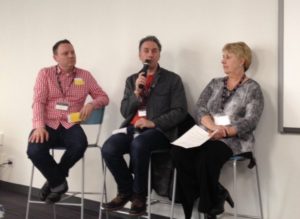 worthwhile dialogue about the royalty process and exchanged valuable information about processing cue sheets, digital royalties, and more. Member Rob Carli spoke about his process of creating and filing music cue sheets.
worthwhile dialogue about the royalty process and exchanged valuable information about processing cue sheets, digital royalties, and more. Member Rob Carli spoke about his process of creating and filing music cue sheets.
SOCAN Annual General Meeting: This meeting of SOCAN members included a live interview with composer Jeff Toyne.

Women in Animation: Lesley Barber appeared on a panel discussing creative process and post production.
AWARDS
Alberta Media Production Industry Association Rosie Awards
Best Original Musical Score (Non-Fiction Under 30 Minutes)
Alec Harrison “RBC presents “Never Say Die: The Jason Day Story”
Nomination – Best Original Musical Score (Drama Under 30 Minutes )
Alec Harrison “Vagina Bug”
Nomination – Best Original Musical Score (Drama Over 30 Minutes)
Alec
Harrison “40 Below And Falling ”

Mike Shields “Blackstone – “Beginning Of The End”
Mike Shields “Blackstone – “Flat Line”
Mitch Lee “The Wizard’s Christmas: Return Of The Snow King”
Mitch Lee ‘”Tales Of The First People”
Nomination – Best Original Musical Score (Non-Fiction Under 30 Minutes)
Alec Harrison “The Harder I Fight II”
Alec Harrison “2015 Nba Draft On Espn Ft. Questlove”
Alec Harrison & Andrea Wettstein “Balancing Act: Portraits Of A Modern Family”
Mike Shields “Day Of Change’
Mitch Lee “Arts Common”
ASCAP Awards:
Most Performed Themes And Underscore – Rob Duncan
Top Television Series – Rob Duncan “Castle”.
2016 ASCAP Composers Choice Award Alf Clausen (nomination).
BSO Spirit XV Premios Goldspirit – Nominees:
Darren Fung – Breakout Composer of the Year
Darren Fung – Best Score Documentary “The Great Human Oddyssey”
Mychael Danna – Best Score Animation “The Good Dinosaur” (co-composed with Jeff Danna)
Voting: http://www.bsospirit.com/2016/06/18/xv-premios-goldspirit/

Canadian Screen Awards
Best Original Music for a Non-Fiction Program or Series:
Darren Fung ”The Great Human Odyssey: Rise of a Species”
Chris Dedrick Music Fund Award for Live Musicians in Media Soundtracks
2016 recipient: Janal Bechthold
Ten composers were selected by their peers as candidates for the award: Mathieu Alepin, Amin Bhatia, Steph Copeland, David Federman, Emily Klassen, Catalin Marin, Erica Procunier, Michelle Osis, & Jeff Toyne.
Hollyweb Festival 2016
Best Score
Adrian Ellis –“Asset”
Marketing Awards 2016
Steph Copeland “MINA Halal: Make it Your Choice” *Winner Silver Award for Multicultural: Original Broadcast.
 Leo Awards – Motion Picture Arts & Sciences Foundation of British Columbia
Leo Awards – Motion Picture Arts & Sciences Foundation of British Columbia
Best Musical Score In A Short Drama:
Terry Frewer – “Reset”
Best Musical Score In A Dramatic Series:
Schaun Tozer – “The Romeo Section – The China Shop”
Best Musical Score In A Television Movie:
Graeme Coleman – “My Sweet Audrina”
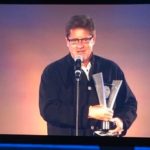
Nomination – Best Musical Score In A Television Movie:
Brent Belke – “Love On The Air”
Nomination – Best Musical Score In A Dramatic Series:
Jeff Toyne – “Rogue – Mea Culpa”
Nomination – Best Musical Score In A Documentary Program Or Series:
Christopher Nickel – “Highway Thru Hell – Fork In the Road”
David Ramos – “Johnny Cash: American Rebel”

Brent Belke – “Ninth Floor”
Nomination – Best Musical Score In An Animation Program Or Series:
Steffan Andrews – “Endangered Species Where No Stump Has Gone Before”
SOCAN Awards:
 Achievement in the Made-For-TV Movie Award
Achievement in the Made-For-TV Movie Award
Christopher Nickel “Honor Student”
 Achievement in Made-for- Film Music Award
Achievement in Made-for- Film Music Award
Catalin Marin “William Shatner Presents: Chaos On The Bridge”

Domestic Television Music Award – Animated
Ari Posner (with Ian LeFevure & Chris Tait) “Johhny Test”
 Domestic TV Music Award – Non-Fiction
Domestic TV Music Award – Non-Fiction
Nick Dyer & Eric Cadesky “Museum Secrets”
 Domestic TV Music Award – Fiction
Domestic TV Music Award – Fiction
Rob Carli “Murdoch Mysteries”
SCREENINGS
Film Festivals
Edinburgh International Film Festival
Suad Bushnaq “Twice Upon a Time”
Hot Docs
Duane Andrews “Terranova Matadora”
Lesley Barber “The Apology”
Darren Fung “Gun Runners”
Ken Myhr “Migrant Dreams”
Ken Myhr “League of Exotique Dancers”
Phil Strong & Thomas Hoy “Random Acts of Legacy”
Rob Teehan “Frame 394”
Tom Third “Cheer Up”
John Welsman “Tempest Storm”
Italian Contemporary Film Festival
Ben Fox “Stray Dog”
Northwest Fest 2016
Ken Myhr “League of Exotique Dancers” *Winner – Best Canadian Feature
Seattle International Film Festival
Suad Bushnaq “The Curve”
SXSW
Jeff Toyne “You Me Her”
TO Webfest
Meiro Stamm “Super Science Friends”
Vancouver International Film Festival:
Maria Molinari & Rohan Staton “End of Days Inc.”
THEATRICAL RELEASE
David Arcus “Fire Song” – limited release
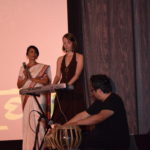
Janal Bechthold & Donald Quan “Gods in Shackles” – LA Theatrical Premiere
Todor Kobakov “Born to Be Blue” (co-composed with Steve London). Simon Miminis and Michael Peter Olsen performed on the score.
Erica Procunier “Cold Deck” – limited release
TELEVISION PREMIERES
Serge Cote “St. Nickel” (UNIS)

John Herberman “Bookaboo – Season 4” (CBC)
Trevor Morris “Taken” (NBC)
Adam White & David Wall “Chef In Your Ear” (Food Network)
OTHER RELEASES AND NEWS
Composer Rose Bolton and filmmaker Marc de Guerre collaborated on “Song of Extinction”, a fully immersive visual and sonic experience exploring the calamitous impact humans are having on the planet and its creatures. The piece had its world premiere at the Luminato Festival. Co-presented by Music in the Barns and performed by: Music in the Barns Chamber Ensemble, Members of Tafelmusik Chamber Choir, VIVA! Youth Singers of Toronto, and music directed by John Hess.
• Greg Fisher and Derek Treffry are celebrating 20 years of collaboration as Fish-fry Music and Sound. Congratulations!
• “Roller Coaster Tycoon World” released March 30, 2016, with score by Maxime Goulet, developed by Nvizzio and produced by Atari
• eOne TV released the soundtrack for “Rogue – Season 2”, score by Jeff Toyne
*************************
As always, we welcome your suggestions for story ideas!
Email the Guild: info@screencomposers.ca
Cue Notes:
Craig McConnell: Editor
Nicholas Stirling: Layout, Web
Admin: Tonya Dedrick, Maria Topalovich
![]()









